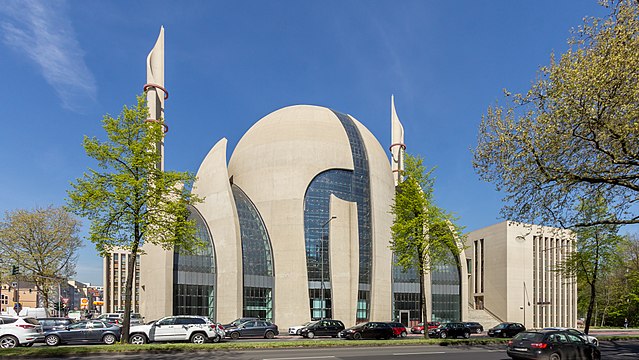Top Qs
Timeline
Chat
Perspective
Turkish-Islamic Union for Religious Affairs
Islamic organisation in Germany From Wikipedia, the free encyclopedia
Remove ads
The Turkish-Islamic Union for Religious Affairs (DİTİB; German: Türkisch-Islamische Union der Anstalt für Religion e.V.; Turkish: Diyanet İşleri Türk-İslam Birliği) is one of the largest Islamic organisations in Germany. Founded in 1984 as a branch of the Presidency of Religious Affairs in Ankara, it is an "arm" of the Turkish state.[1] The headquarters are in Cologne-Ehrenfeld.



As of 2016, the DİTİB funds 900 mosques in Germany.[1]
The imams and the religious teachers, officially classified as civil servants of the Turkish state, are trained in Ankara and sent to Germany from Turkey.[2] DİTİB claims it is independent of the Government of Turkey.[2] Because the state back then[when?] was almost bankrupt, the officials had to be paid with money from the Muslim World League, which provoked protest from secularists. The fixation on Turkey and the Turkish language proved to be a handicap, because other Islamic organisations used the German language in public. Many individuals, DİTİB members and non-members alike, considered the use of German to be a more inclusive, respectful, and necessary approach for a dialogue with the host country's citizens and institutions.
Homepages of local DİTİB chapters have featured anti-Christian, antisemitic, and anti-Western hate speech.[3]
Remove ads
Organisation
DITIB received state aid from the Federal Ministry of the Interior in Germany:[2] in the period 2012 to 2018, DİTİB received about €6 million.[4] When it was initially founded, around 230 associations were members; by 2005 the number was 870. The local associations are registered independently for legal and financial purposes, but share the goals and principles of DİTİB as their foundation. They also acknowledge DİTİB as their umbrella organisation. It has a number of social and religious institutions.[citation needed]
In 2018, the Federal Ministry of the Interior cut all funding after DİTİB had been involved in multiple controversies, including its refusal to take part in a Cologne anti-terror march in 2017.[5][6]
Remove ads
2004 rally
Under the presidency of Rıdvan Çakır, DİTİB tries to present itself as a more integrated actor in German society. DİTİB was one of the initiators of the mass-event "Gemeinsam für Frieden und gegen Terror" (en: "Together for Peace and against Terror"). Over 20,000 Muslims participated in this demonstration, which was held on November 21, 2004 in Cologne. Participants who gave speeches included the Green Party politician Claudia Roth, Bavaria's Interior Minister Günther Beckstein, and Fritz Behrens. The goal was to signal the disapproval of the use of violence in the name of Islam. It was one of the largest demonstrations of its kind in Germany's history.
Remove ads
Controversies
Summarize
Perspective
Antisemitism
Since DİTİB's foundation in 1984, several of its chapters across Germany, departments, and senior representatives, like board members and religious scholars, have been found guilty of violating the Basic Law for the Federal Republic of Germany by spreading antisemitic hate speech, offensive libels, and incitement to violence against the Jewish people, mostly through the organization's social media accounts.[7][8]
Armenophobia and Armenian genocide denial
DİTİB has been one of the strongest opponents of Germany's recognition of the Armenian genocide, and has consistently lobbied against its formal recognition, until the latter was finally formally recognized by the German Bundestag on June 2, 2016.[9][10] Despite this, the organization's imams and religious scholars continue to publicly and explicitly deny the Armenian genocide, while many of them have also openly spread anti-Armenian sentiment.[11][12]
Anti-Kurdish sentiment and endorsement of the Turkish invasion and occupation of northern Syria
DİTİB has regularly acted as an extension of the Turkish government, which included spreading animosity towards the Kurdish people and expressing support for the 2019 Turkish offensive into northeastern Syria and the subsequent occupation of a large part of the country, which was accompanied by violence and atrocities by the Turkish military and paramilitary forces against the local population, including ethnic cleansing of Kurdish people.[13][14]
See also
References
External links
Wikiwand - on
Seamless Wikipedia browsing. On steroids.
Remove ads

